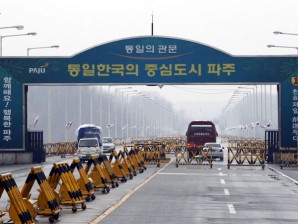South Koreans stirred but not shaken by North threat

South Korean vehicles, left, return from the North Korean city of Kaesong at Unification Bridge in Paju, South Korea, near the border village of Panmunjom. AP
SEOUL – South Koreans are not immune to the anxiety generated by North Korea’s toxic threats of nuclear war, but given that their country is the direct target of many of them, they seem remarkably unshaken.
On the face of it, there’s a fair bit to be concerned about.
The South Korean capital Seoul lies just 50 kilometers (35 miles) from the border with the North — the world’s last great Cold War frontier, bristling with watchtowers and landmines.
On the other side stands the world’s fifth-largest army, with a small nuclear arsenal, led by a young man in his late 20s, who only recently inherited the job from his father.
But on the day world leaders were scrambling to condemn North Korea for its third nuclear test, the top keyword search on South Korean Internet sites was “Innisfree” — a popular cosmetics brand that was having a big sale.
Article continues after this advertisementAnd when Pyongyang declared it had entered into a “state of war” with South Korea on March 30, online chat rooms were dominated by discussions over pop star Seo In-Guk washing strawberries on a TV reality show the day before.
Article continues after this advertisementJames Pearson, the Seoul-based editor of koreaBANG, a website that covers trending topics on South Korean social networks and news portals, said the indifference was partly down to “North Korea fatigue.”
“There’s a sense of ‘not this again’ about the whole threat cycle, especially among younger South Koreans who are quite apathetic about North Korea and politics in general,” Pearson said.
“It’s not that North Korea isn’t being discussed. It is. But it’s competing with, and often losing out to, far more mundane matters,” he added.
The level of concern over the current crisis seems closely linked to age and can be tracked as a steadily rising graph that peaks with the generation who lived through the 1950-1953 Korean War.
“Of course I’m worried. Very worried,” said Kim Woo-Kil, 85, a retired commercial shipping officer and war veteran.
“The situation just seems to be getting worse by the day, and I don’t see where it ends. There must be a breaking point.
“The younger generation doesn’t really see the danger. I worry about them,” Kim said.
“It’s all different now,” said 72-year-old widow Lee Jong-Ja. “The weapons are so fast, so powerful. What precautions can you take? It doesn’t seem worth it.”
When a North Korean negotiator threatened to turn Seoul into “a sea of fire,” in 1994, there was widespread panic that saw people stripping store shelves of canned goods.
Since then “sea of fire” has become something of a propagandist mantra that the North intones at times of crisis, and has lost any real potency.
Additional threats to “burn the enemy to ashes” and “throw them into the furnace” have also become so commonplace that they barely register over the border.
“I talk about it, with patients as well as colleagues,” said B.H. Ahn, a doctor in Seoul. “But I don’t see or feel any real sense of alarm. It seems like just another replay of an old drama.”
“When we get together, we talk about family, work … the usual stuff. Not so much North Korea,” said businessman Lee Eun-Won, 51.
“The North has done this so many times. Maybe there’s a bit more concern. Kim Jong-Un is young and doesn’t seem to know when to stop, but he’s not going to war,” Lee said.
Where there is some anxiety, the youth and inexperience of North Korean leader Kim Jong-Un are often cited, reflecting a common concern that, while the two Koreas know the crisis script backwards, Kim may try some dangerous improvisation.
In the cafes, bars and clubs of Seoul’s upscale Gangnam district — the affluent social lifestyle satirized in Psy’s global hit “Gangnam Style” — has proved impervious to the North’s warlike rhetoric.
“When the news about war comes out, then maybe people feel afraid for a brief time, but they forget very quickly,” said coffee bar barista Nash Kim, 31.
“I’m positive, because there is no reason to be negative. We have a government. We have an army. If our government wanted a war, it would have already happened,” Kim said.
And even with Pyongyang threatening to unleash a second Korean War, tour operators continue to ferry busloads of tourists up to the border with North Korea every day to glimpse the legacy of the first one.
“We’re fully booked,” said a spokesman for Seoul City Tour, which offers regular excursions to the frontier truce village of Panmunjom and one of a number of secret invasion tunnels dug by North Korea.
“We’ve had some overseas calls from people wanting to know if it’s safe to come to South Korea. My message is: it’s business as usual. We’ve been through this kind of situation many times over,” the spokesman said.